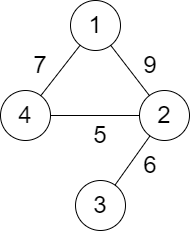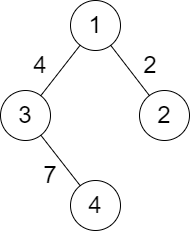You are given a positive integer n representing n cities numbered from 1 to n. You are also given a 2D array roads where roads[i] = [ai, bi, distancei] indicates that there is a bidirectional road between cities ai and bi with a distance equal to distancei. The cities graph is not necessarily connected.
The score of a path between two cities is defined as the minimum distance of a road in this path.
Return the minimum possible score of a path between cities 1 and n.
Note:
A path is a sequence of roads between two cities.
It is allowed for a path to contain the same road multiple times, and you can visit cities 1 and n multiple times along the path.
The test cases are generated such that there is at least one path between 1 and n.
Example 1:

Input: n = 4, roads = [[1,2,9],[2,3,6],[2,4,5],[1,4,7]]
Output: 5
Explanation: The path from city 1 to 4 with the minimum score is: 1 -> 2 -> 4. The score of this path is min(9,5) = 5.
It can be shown that no other path has less score.
Example 2:

Input: n = 4, roads = [[1,2,2],[1,3,4],[3,4,7]]
Output: 2
Explanation: The path from city 1 to 4 with the minimum score is: 1 -> 2 -> 1 -> 3 -> 4. The score of this path is min(2,2,4,7) = 2.
Constraints:
- 2 <= n <= 10^5
- 1 <= roads.length <= 10^5
- roads[i].length == 3
- 1 <= ai, bi <= n
- ai != bi
- 1 <= distancei <= 10^4
- There are no repeated edges.
- There is at least one path between 1 and n.
先说目前的解法, 从 1 开始 bfs 遍历整个与 1 相连的 component, 找出其中所有 path 中 distance 的最小值。
写到这我突然想到, 如果用 union-find 的方法找所有与 1 在同一个 component 中的 node, 找的过程中同时把最小的 distance 找出来,这样也是可以解出来的。可能时间复杂度还会低一点。有兴趣的同学可以实现一下
use std::collections::HashMap;
impl Solution {
pub fn min_score(n: i32, roads: Vec<Vec<i32>>) -> i32 {
let roads = roads.into_iter().fold(HashMap::new(), |mut m, r| {
m.entry(r[0] as usize)
.or_insert(Vec::new())
.push((r[1] as usize, r[2]));
m.entry(r[1] as usize)
.or_insert(Vec::new())
.push((r[0] as usize, r[2]));
m
});
let mut ans = i32::MAX;
let mut visited = vec![false; n as usize + 1];
let mut queue = vec![1];
visited[1] = true;
while let Some(p) = queue.pop() {
for next in roads.get(&p).unwrap() {
ans = ans.min(next.1);
if !visited[next.0] {
visited[next.0] = true;
queue.push(next.0);
}
}
}
ans
}
}




 给定n个城市和双向道路的距离,找到从城市1到n的最低得分路径,其中路径得分定义为路径中最低的道路距离。问题可以通过BFS或Union-Find算法解决,确保在寻找同一连通组件中的节点时计算最低距离。示例显示了如何找到这样的路径并返回其得分。
给定n个城市和双向道路的距离,找到从城市1到n的最低得分路径,其中路径得分定义为路径中最低的道路距离。问题可以通过BFS或Union-Find算法解决,确保在寻找同一连通组件中的节点时计算最低距离。示例显示了如何找到这样的路径并返回其得分。
















 203
203

 被折叠的 条评论
为什么被折叠?
被折叠的 条评论
为什么被折叠?








